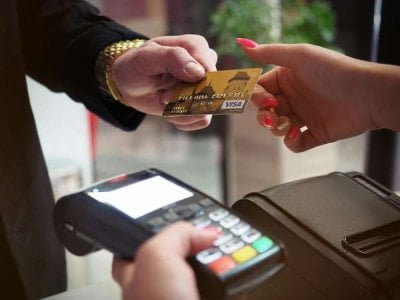Are these fees draining your bank account? MP scrutinises major banks for 'sneaky' surcharges
By
Danielle F.
- Replies 45
In the age of digital transactions, the convenience of a simple tap or swipe has become second nature.
However, it's easy to overlook the small deductions that chip away at customers' savings.
What if those minor charges were not so minor after all?
Commonwealth Bank and Westpac recently faced criticism for 'sneaky charges' on card transactions.
These surcharges have cost Australians a staggering $4 billion a year.
Labor MP Jerome Laxale, who represented the Sydney seat of Bennelong, brought the issue into the spotlight.
MP Laxale took a stand against the surcharges imposed on businesses for card technology use, as these costs inevitably trickle down to consumers.
'We are in the middle of a cost-of-living crisis. Consumers are being charged blended rates, 1.1 per cent to 1.6 per cent, and it all adds up,' MP Laxale pointed out.
'To consumers, that's around $140 a year.'
'Cash is down to 30 per cent, and debit is the new cash. Why is it that we are still paying increasingly exorbitant fees every time that we present our card or we tap?' he further asked.
MP Laxale's petition, preceded by the Reserve Bank of Australia's (RBA) comprehensive review of payment regulations, could abolish these charges.
The petition could also introduce greater transparency in how costs are passed onto consumers.
The RBA's Payments Systems Board started preparing for consultations, and it could reshape digital payments in Australia.
'I want the RBA to do what other reserve banks have done across the world and legislate in favour of small businesses and consumers because the inequity here doesn't make sense anymore,' MP Laxale emphasised.
Earlier this year, Canstar research revealed the extent of the financial burden surcharges placed on Australians.
The results revealed a 6.4 per cent increase from the previous year.
During a parliamentary inquiry, MP Laxale confronted the heads of the big four banks and questioned the justification behind the additional cost of paying items with a debit card.
Westpac's Peter King admitted that the rules were confusing and suggested a review of customer surcharge rates.
Meanwhile, Commonwealth Bank's Matt Comyn challenged the $4 billion figure and highlighted Australia's relatively low debit interchange fees.
The debate over card surcharges is not just about the numbers; it's about the principle.
The question remains whether the lower costs of electronic payments are genuinely benefiting consumers or if they are lining the pockets of financial institutions.
The outcome of the RBA's review could have significant implications for everyone's financial well-being.

Have you noticed these 'sneaky charges' on your bank statements? What could be done to prevent these fees from stacking up? Share your experiences and join the conversation in the comments section below.
However, it's easy to overlook the small deductions that chip away at customers' savings.
What if those minor charges were not so minor after all?
Commonwealth Bank and Westpac recently faced criticism for 'sneaky charges' on card transactions.
These surcharges have cost Australians a staggering $4 billion a year.
Labor MP Jerome Laxale, who represented the Sydney seat of Bennelong, brought the issue into the spotlight.
MP Laxale took a stand against the surcharges imposed on businesses for card technology use, as these costs inevitably trickle down to consumers.
'We are in the middle of a cost-of-living crisis. Consumers are being charged blended rates, 1.1 per cent to 1.6 per cent, and it all adds up,' MP Laxale pointed out.
'To consumers, that's around $140 a year.'
'Cash is down to 30 per cent, and debit is the new cash. Why is it that we are still paying increasingly exorbitant fees every time that we present our card or we tap?' he further asked.
MP Laxale's petition, preceded by the Reserve Bank of Australia's (RBA) comprehensive review of payment regulations, could abolish these charges.
The petition could also introduce greater transparency in how costs are passed onto consumers.
The RBA's Payments Systems Board started preparing for consultations, and it could reshape digital payments in Australia.
'I want the RBA to do what other reserve banks have done across the world and legislate in favour of small businesses and consumers because the inequity here doesn't make sense anymore,' MP Laxale emphasised.
Earlier this year, Canstar research revealed the extent of the financial burden surcharges placed on Australians.
The results revealed a 6.4 per cent increase from the previous year.
During a parliamentary inquiry, MP Laxale confronted the heads of the big four banks and questioned the justification behind the additional cost of paying items with a debit card.
Westpac's Peter King admitted that the rules were confusing and suggested a review of customer surcharge rates.
Meanwhile, Commonwealth Bank's Matt Comyn challenged the $4 billion figure and highlighted Australia's relatively low debit interchange fees.
The debate over card surcharges is not just about the numbers; it's about the principle.
The question remains whether the lower costs of electronic payments are genuinely benefiting consumers or if they are lining the pockets of financial institutions.
The outcome of the RBA's review could have significant implications for everyone's financial well-being.
Key Takeaways
- Sydney MP Jerome Laxale petitioned to end surcharges on card transactions, which could cost Australians $4 billion a year.
- He argued that with debit cards being the new payment norm, the rules need to be reviewed, especially during a cost of living crisis.
- The Reserve Bank of Australia's Payments Systems Board started reviewing bank regulations, with a consultation process starting soon.
- The bosses of Commonwealth Bank and Westpac acknowledged the issue. Westpac's Peter King called the rules 'confusing', and Commonwealth's Matt Comyn shared his scepticism about the $4 billion figure.








